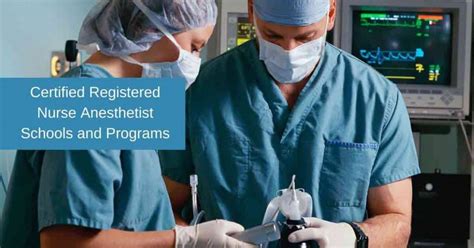Are you an aspiring nurse anesthetist seeking to pursue a career in advanced practice nursing? Look no further than Pennsylvania, home to several renowned CRNA programs that will equip you with the skills and knowledge to excel in this rewarding field. This comprehensive guide will delve into the intricacies of Pennsylvania CRNA programs, providing you with the information you need to make informed decisions about your educational journey.

Pennsylvania CRNA Programs at a Glance
Pennsylvania boasts a robust network of CRNA programs, offering a range of options for students seeking to advance their nursing careers. These programs adhere to the rigorous standards set forth by the Council on Accreditation of Nurse Anesthesia Educational Programs (COA) and prepare graduates for national certification through the National Board of Certification and Recertification of Nurse Anesthetists (NBCRNA).
Number of Programs: Pennsylvania has 7 accredited CRNA programs
Degrees Offered: Master of Science in Nurse Anesthesia (MSN)
Accreditation: All programs are accredited by the COA
Program Length: Typically 2-3 years of full-time study
Top-Ranked Pennsylvania CRNA Programs
According to the reputable website US News & World Report, the following Pennsylvania CRNA programs consistently rank among the top in the nation:
| Rank | Program | Location |
|---|---|---|
| 1 | University of Pittsburgh | Pittsburgh |
| 2 | Drexel University | Philadelphia |
| 3 | Thomas Jefferson University | Philadelphia |
| 4 | University of Pennsylvania | Philadelphia |
| 5 | Temple University | Philadelphia |
Admission Requirements for Pennsylvania CRNA Programs
Admission to Pennsylvania CRNA programs is highly competitive and typically requires the following qualifications:
- Bachelor of Science in Nursing (BSN) from an accredited program
- Minimum GPA of 3.0 or higher
- Certifications (e.g., BLS, ACLS, PALS)
- One to three years of experience as a registered nurse (RN) in a critical care setting
- GRE or MAT scores
- Strong letters of recommendation
Curriculum of Pennsylvania CRNA Programs
Pennsylvania CRNA programs provide a comprehensive curriculum that combines didactic coursework with clinical rotations. Coursework typically includes:
- Advanced Physiology and Pharmacology
- Advanced Pathophysiology
- Pain Management
- Anesthesia Techniques
- Crisis Management
- Nurse Anesthesia Practice
Clinical Rotations: Students complete supervised clinical rotations in various hospital settings, gaining hands-on experience in administering anesthesia in different surgical specialties.
Career Opportunities for CRNAs in Pennsylvania
CRNAs play a vital role in the healthcare system of Pennsylvania, providing anesthesia services in various settings, including:
- Hospitals
- Ambulatory surgery centers
- Dental offices
- Pain clinics
Employment Outlook: The demand for CRNAs in Pennsylvania is expected to grow significantly in the coming years, with a projected 20% increase in job openings from 2019 to 2029.
Salary: According to the Bureau of Labor Statistics, the median annual salary for CRNAs in Pennsylvania is $168,560.
Additional Tips for Applying to Pennsylvania CRNA Programs
- Gain experience as a critical care RN
- Seek mentorship from experienced CRNAs
- Attend CRNA conferences and workshops
- Prepare thoroughly for the GRE or MAT
- Craft a compelling personal statement
- Start the application process early
Resources for Pennsylvania CRNA Programs
- Pennsylvania Association of Nurse Anesthetists (PANA): https://www.panaweb.org/
- American Association of Nurse Anesthetists (AANA): https://www.aana.com/
- Council on Accreditation of Nurse Anesthesia Educational Programs (COA): https://www.coa-portal.org/
Conclusion
Pennsylvania CRNA programs offer a world-class education that prepares graduates for successful careers as nurse anesthetists. With its convenient locations, top-ranked programs, and ample career opportunities, Pennsylvania is an ideal place to pursue your CRNA aspirations. By following the guidance outlined in this comprehensive guide, you can increase your chances of admission and embark on a rewarding path in this dynamic and in-demand field.
